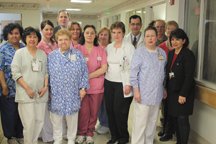Who knows better about what works in a hospital than the people who, day in and day out, do the jobs? This could be about anything, from how to provide services more efficiently, to how to make a patient feel comfortable.
That’s the basic concept behind a program at Bayonne Medical Center called “Transforming Care at the Bedside” – allowing the staff who are involved in the day-to-day operations to give ideas on how to improve operations.
Over the last few months, the staff has been suggesting how to improve services at BMC as part of a 50-hospital network throughout New Jersey. While each of these hospitals institutes its own committee that reviews ideas and helps them move ahead, hospitals share their information as to what might work so that each hospital can try them if they so see fit.
“The staff would know better than anyone else how things can be done better.” – Patricia Whipkey
________
Whipkey said under this program, the staff will be encouraged to come forward with their ideas for improving patient care.
In 2003, the Robert Wood Johnson Foundation and the Institute of Healthcare Improvement (IHI) joined forces to improve patient and staff satisfaction, staff retention, and foremost, patient care and safety. The Transforming the Care at the Bedside initiative, a national program of the Robert Wood Johnson Foundation, was set up to improve care on medical and surgical units.
Initial phase
Whipkey said this initiative will tap the experience of people who often have the most contact with patients or other activities performed on the surgical unit, and allows these people to explore possibly better ways of approaching these activities.
“The staff would know better than anyone else how things can be done better,” she said.
Novak said this three-year project has a double benefit of improving the quality of care for patients, while at the same time increasing staff satisfaction and retention.
Whipkey said once this program is established in this department and it proves successful, it can be rolled out into other areas of the hospital.
Carr said the initial phase will involve the 40-bed unit of BMC’s surgical department, which includes a staff of 38 at every level of service, from care management to hostess.
A nurse or other staff member, Carr said, may have an idea as to how to make an operation go more smoothly. He or she would be empowered to change the operation in order to test the idea.
Novich said the employee will bring the idea to the team, which will discuss how to implement it, and that person would become the champion of the idea. Ideas can be big or small.
“Later, we ask them back to show us how it worked,” said Poss.
For the most part, the ideas will not involve spending additional money, said Whipkey, and can be done with existing staff.
Although the most immediate impact of this program will be on those working for or being served by Bayonne Medical Center, the program is part of an collective in which information is being shared among the 50 hospitals.
